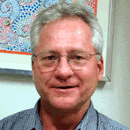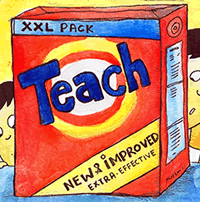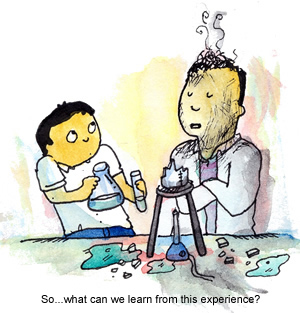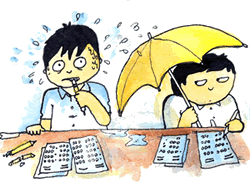Young Children’s Voices in Mathematical Problem Solving
Contributed by Dr Ho Siew Yin and Sng Wei Qin Abbie, from NTUC First Campus, for SingTeach Virtual […]
Read More
Teachers are well aware of the limitations of traditional tests. But what does it mean to make use of the alternative? Professor Scott Paris responds to some of the frequently asked questions on alternative assessments.

 It would be hard to find a teacher who truly believes that a multiple-choice exam can reveal everything she needs to know about her students’ learning.
It would be hard to find a teacher who truly believes that a multiple-choice exam can reveal everything she needs to know about her students’ learning.
In a world of critical thinkers, multiple intelligences and “Teach Less, Learn More”, educators are now going beyond asking students to “choose the best answer”. Yet, while many are aware of the limitations of traditional assessment, few actually know what the alternative has to offer, how to make use of it, or whether it fits into an educational system defined by largely high-stakes examinations.
SingTeach speaks to University of Michigan professor Scott Paris about some of the most common questions and dilemmas about alternative assessments. Read on to find out what this means for teaching in the Singapore classroom.
A: I don’t think that anyone thinks we’re going to replace the current system with alternative assessments. “Alternative” mainly means supplemental, so that there are different ways of giving information about students.
The emphasis on alternative assessment and authentic assessment is really to supplement the kind of information that teachers have about students. This is so that we don’t just have test scores and percentiles. Instead, we have more diagnostic information about their strengths and weaknesses in particular disciplines. We can figure out their scientific problem-solving strategies, their mathematical abilities and their literacy abilities so that people can provide better instruction.
A: I think the notion of trading reliability for validity is one of the outcomes because psychometric instruments are designed to be highly reliable. But these tests can be too narrow or may not necessarily have the qualities of validity that the teacher wants.
I think that alternative assessments have lower reliability because if you do an assessment that’s based on performance or ongoing classroom activity, you expect it to lead to learning. So, good alternative assessments have lower reliability because learning takes place. That’s not a negative feature, that’s a positive feature.
Instead of seeing it as a trade-off between reliability and validity, I look at it as different tools for different purposes. If you need a highly reliable tool, maybe a psychometric test is more appropriate. But if you need a tool that’s very valid for the content of the classroom instruction and prediction of success and motivation, then you might turn to more performance-based assessments.
 A: I think alternative assessments are partly created to compensate for some of the weaknesses in traditional, high-stakes multiple-choice or essay types of tests.
A: I think alternative assessments are partly created to compensate for some of the weaknesses in traditional, high-stakes multiple-choice or essay types of tests.
I think people who teach subjects like Humanities, dance or performance would never use a standardised test to look at dramatic abilities or poetic expression.
The question really is whether you can use alternative assessments in your traditional subjects like Math and Science. And I think you can. For example, a typical Science question you may ask is, “What is Boyle’s law?” or “What is the Bernoulli’s Principle?” It might be reliable, it might even have validity.
But it’s easily memorised and doesn’t really lead to deeper thinking, creativity or motivation.
If you turn that around a bit to an alternative assessment, you might say: “What are five ways that you can demonstrate the Bernoulli’s Principle?” Suddenly, it becomes a better test. Suddenly, you have many different ways you can talk about a scientific principle and that shows the depth of the students’ understanding in a way that perhaps a traditional test won’t.
A: Well, there are many problems that are very well known. One is that it’s hard to get quantitative data and so it’s very difficult to use alternative assessments for high-stakes decisions. So, there’s a reluctance to use them as replacements for standardised tests.
Another problem is that it takes a lot of imagination from the teacher. Unless the teacher is willing to take a chance and see if there are different assessments that work, it will be very hard for the teacher to use the assessments.
Schools can implement some alternative assessments with professional development and have teams of teachers trying it. Let’s say they create an alternative assessment in Science, and they see how it works well and how it doesn’t. Teachers can refine it and create the assessment to fit their students and their purposes. I think that’s a very positive way that teachers capitalise on their knowledge together.
 A: The answer is yes and no. The test anxiety can be good in some ways. If you were going to do a dance performance or piano recital, you’d be anxious and excited. Some of that’s good. It’s good to be excited, eager and maybe a little bit anxious about how you’ll perform. That can be positive in a motivational way.
A: The answer is yes and no. The test anxiety can be good in some ways. If you were going to do a dance performance or piano recital, you’d be anxious and excited. Some of that’s good. It’s good to be excited, eager and maybe a little bit anxious about how you’ll perform. That can be positive in a motivational way.
The negative part of the anxiety is when you worry so much about how you’ll do and whether you’ll fail that your emotions undermine your performance.
That type of test anxiety is usually less apparent in an alternative assessment because if you don’t do well, you could do it again.
So, I think alternative assessments diminish the negative test anxiety and build up a more positive emotion about expectation and eagerness. You can be eager to show your ability and knowledge instead of being afraid to fail.
A: Teachers are really critical for alternative assessments because they need to choose them, they need to use them wisely and they need to interpret them wisely. From my perspective, the main values of an alternative assessment are to provide better diagnostic information to the teacher and to allow students to demonstrate competence.
I think this is a very important topic and all teachers struggle trying to find the balance between the different ways to assess their students’ learning. There’s not enough time to do everything so they have to be very careful and choose wisely when to use alternative assessments and how to use the information. That way, they don’t become too frustrated trying to give too many assessments or not knowing how to use the information.
I guess the key that I see for any assessment is connecting to the students’ learning. If the teacher gets more information, and the student learns more from the assessment, then it’s successful.
A: I think it fits well in Singapore as it does in the rest of the world. Singapore has a wonderful educational system with high achievement. But like many aspects of schooling, the traditional pedagogies emphasise rote knowledge, memorisation of facts over concepts.
I think alternative assessments ask teachers and students to think differently. And that’s a good thing because if a teacher decides that she wants to assess a different type of knowledge and she has a clever way of asking students to demonstrate it, then the teacher is showing creativity in her assessment and pedagogy.
Then, the student is given a greater variety of options to demonstrate knowledge. Some students who don’t take multiple-choice tests well, don’t memorise things or don’t really like to learn from books can be very intelligent about the same principles. They simply need to display their knowledge in a different way.